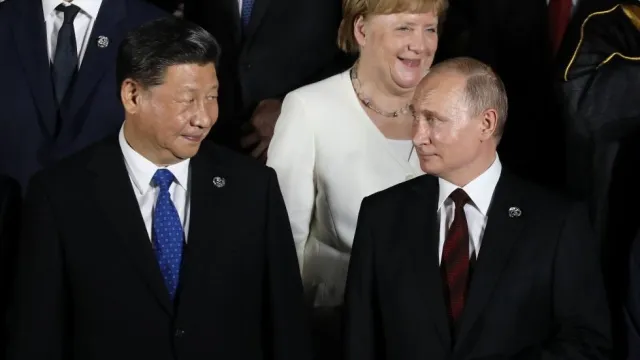China and Russia pose less of a threat to Western populations now than they did a year ago, as public attention shifts to non-traditional risks such as mass migration and radical Islam, CNBC reports.
Public perceptions of traditional hard security risks are higher now than they were three years ago, but have declined since 2022, when the military conflict in Ukraine began, according to the Munich Security Index 2024 survey.
The survey results point to a disconnect between public sentiment and political policy as world leaders meet this week at the Munich Security Conference to discuss “a downward trend in global politics marked by rising geopolitical tensions and economic uncertainty.”
The main issues on the agenda will be the ongoing war in Ukraine, the war between Israel and Hamas, as well as the expansion of NATO and the possible return of Donald Trump to the White House.
However, public opinion on medium-term economic and geopolitical risks is broadly in line: most respondents in Western countries believe that the power of China and other powers in the Global South will increase significantly over the next decade, while Western countries are likely to stagnate or decline.
In a survey of 12,000 people from the G7 countries, as well as Brazil, China, India, South Africa and China, few respondents from Western countries believed that their country would be better off and richer in 10 years’ time. In contrast, the majority of respondents from emerging economies believed that they would be better off financially and politically.
Last year, Russia was one of the top threats to the G7 countries. However, according to the survey, conducted between October and November 2023, most of these perceived risks have disappeared.
This year, only citizens in the UK and Japan still see Moscow as a major threat, while Germany and Italy have seen a significant easing of concerns. Among other things, respondents reported a decline in concerns about the risks of nuclear conflict and energy supply disruptions.
China was also perceived more favourably this year than last by five G7 countries, with Canada and Japan being the exceptions. Notably, Chinese respondents see all countries except Russia and Belarus as more threatening than before. Moreover, it was the only country to name the United States as a threat.
However, perceptions of non-traditional risks have changed in all countries, with people around the world expressing concern about environmental threats, the risks of mass migration due to war or climate change, and organised crime. Environmental concerns ranked in the top three in all countries except the US.
The perceived threat of radical Islam has also increased markedly, although the report’s authors noted that this sentiment is mainly concentrated in Europe and North America and is likely a consequence of the war between Israel and Hamas.
Cybersecurity issues topped the list of risks in China and the US, as both countries increase restrictions in a race against each other for technological dominance.
The index was accompanied by a report titled “Lose-Lose?” that highlighted the continued shift away from global co-operation and towards transactional, protectionist policies. The report said:
“As more and more states define their success relative to others, a vicious cycle of relative-gains thinking, prosperity losses, and growing geopolitical tensions threatens to unroll. The resulting lose-lose dynamics are already unfolding in many policy fields and engulfing various regions.”
It added that this year’s super-election cycle could further exacerbate the risks of “a backlash against democracy, a growing polarisation of society and the rise of right-wing populism”, further undermining international cooperation. The report also said:
“Populist forces have further amplified the sentiment that some actors are gaining at the expense of others, as an extreme form of liberalism exacerbates who wins and who loses from economic globalisation.”
The report said that Trump’s return to the US presidency could potentially “signal the end of trusting cooperation between Democratic states”. Indeed, on Saturday, the Republican presidential candidate said he would “encourage” Russia to attack NATO allies if they failed to meet their spending commitments.
